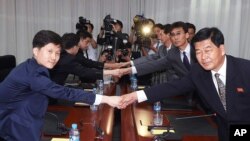North and South Korea have agreed to a five percent minimum wage hike for North Korean workers at the Kaesong Industrial Complex.
South Korea’s Unification Ministry announced Tuesday that that would increase the North Korean workers’ minimum wage to $73.87 per month.
Pyongyang initially asked for the minimum wage to be increased by 5.18 percent, which would have violated the regulations initially set for the business park.
After Tuesday’s breakthrough, South Korean companies will be able pay their North Korean workers for the month of July before the monthly pay deadline. The difference between what was paid from March through June and the newly agreed rate will be paid out retroactively.
In addition to the minimum wage, the two sides are also discussing ways for a steady supply of labor, a wage system reshuffle, as well as difficulties in communications, customs and commuting to the inter-Korean complex.
A South Korean businessman with a factory within the Kaesong complex, who did not want to be identified so he could speak freely, welcomed the move, but not without asking for further improvements.
“I am glad. But since we had much difficulty running our factories for a prolonged time due to the minimum wage negotiations, it would be ideal if we don’t have to face that again,” the businessman told VOA News. "North and South Korea should work together on improving productivity [at Kaesong].”
Another South Korean businessman, who also preferred to remain anonymous, said while the wages have risen consistently during the last decade, productivity has stayed the same. He said the burden facing South Korean companies is closer to a 20 percent jump in labor cost because of persistent demands for a rate hike and frequent bonuses.
The two sides have been at odds over the Kaesong wage increase since late last year when the North unilaterally revised 13 labor regulations agreed to by both sides.
In February, Pyongyang implemented two of the 13 revisions to unilaterally demand a rise in the minimum wage. Seoul maintains a rate hike over the five percent mark is in violation of the Kaesong regulations.
Jee Abbey Lee contributed to this report, which was produced in collaboration with the VOA Korean service.




